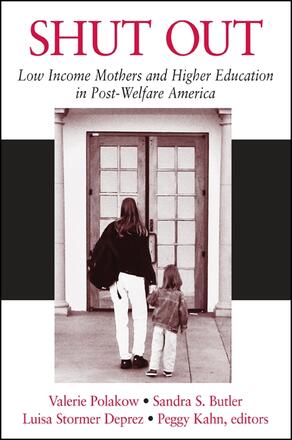
Shut Out
Low Income Mothers and Higher Education in Post-Welfare America
Alternative formats available from:
Documents the economic, educational, and existential struggles that single mothers in poverty confront in the current welfare climate.
Description
Shut Out portrays in vivid detail the economic, educational, and existential struggles that single mothers confront as they fight back against a welfare-to-work regime that denies them access to higher education and obstructs their aspirations as autonomous women, determined to exit poverty and attain family self-sufficiency. The book is a unique blend of policy analysis and lived realities. The voices of student mothers fighting to stay in school, and organizing for a different future, are embedded in an analysis grounded in the educational experiences of women in poverty across the states. Harsh and punitive public policies that are designed to keep poor women trapped in low wage work are juxtaposed against the actions of those who, together with their allies, have resisted—inspired by a vision of a different world made possible by higher education.
Contributing authors discuss the provisions of the 1996 "welfare reform" (PRWORA) Act and the myriad of statewide responses to educational options within the framework of national legislation. In documenting the multiple obstacles and policy restrictions that low income women face, the book also highlights successful state programs, institutional practices, and community-based programs that afford low income women educational opportunities. The afterword summarizes recent legislative developments and makes policy and advocacy recommendations for the future.
At Eastern Michigan University, Valerie Polakow is Professor of Education and Director of the Center for Child and Family Programs at the Institute for the Study of Children, Families, and Communities. Sandra S. Butler is Associate Professor of Social Work at the University of Maine and Resident Scholar at the University of Maine Center on Aging. Luisa Stormer Deprez is Associate Professor of Sociology and Women's Studies and Interim Dean of the College of Arts and Sciences at the University of Southern Maine.
Reviews
"This is a must-read book for educators and activists interested in the topics of race, class, gender, and education, but also, I believe, for everyone who cares about American democracy and social justice … The book's style will hold readers' attention even if they don't know much about American social policy and welfare laws." — Alice E. Ginsberg, Feminist Teacher
"…Shut Out provides a rich array of scholarship on the subject … Written on the eve of the reauthorization of federal welfare reform, with even harsher work requirements, in the 108th Congress, Shut Out is a call for action." — Feminist Collections
"As the tide of welfare 'reform' in the United States continues to push rightward and the Congress moves to press for even more work requirements and even less opportunities for postsecondary education, this book reminds us that there are much better ways to reduce poverty and provide real economic futures for poor mothers and their families." — Feminist Economics
"Research that explores the perspective and daily lives of welfare recipients, particularly individuals participating in higher education or vocational training programs, has been limited. This book therefore offers an important contribution to the field." — Journal of Sociology and Social Welfare
"This well-organized reader by social work and education researchers on welfare recipients' access to postsecondary education observes … that the 1996 welfare overhaul made it difficult for low-income women with children to pursue higher education." — CHOICE
"The essays collected here demonstrate that 'welfare reform' is not about helping women escape the so-called welfare trap, but about keeping women entrapped, in low wage work and deep poverty. One way this is being accomplished is by constructing virtually insuperable obstacles to the pursuit of higher education and the possibility of better jobs and earnings. Read this book to learn about this side of our new welfare policies." — Frances Fox Piven, author of The War at Home: The Domestic Causes and Consequences of Bush's Militarism and coauthor of The Breaking of the American Social Compact and Regulating the Poor: The Functions of Public Welfare
"This collection fills a major gap in the literature on low income women and higher education, with particular emphasis on women on welfare and the policy history that has indeed shut them out." — Marilyn Gittell, Director of the Howard Samuels State Management and Policy Center at the City University of New York Graduate School
"Far from being disorganized, work-averse parasites, welfare moms are starting a revolution. They're going to college so they can get better jobs to make better lives for themselves and their children. This book tells us what we need to do to help them do it: Move over and get out of the way!" — Heidi Hartmann, President, Institute for Women's Policy Research